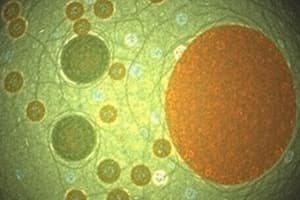Podcast
Questions and Answers
Why can single-celled organisms rely on diffusion for transporting molecules into their body?
Why can single-celled organisms rely on diffusion for transporting molecules into their body?
- They have a small surface area to volume ratio.
- They have a complex transport system.
- They have a low metabolic rate.
- They have a large surface area to volume ratio. (correct)
Why do multicellular organisms need adaptations for molecule transport instead of relying on diffusion alone?
Why do multicellular organisms need adaptations for molecule transport instead of relying on diffusion alone?
- They have a large surface area to volume ratio.
- They have a small surface area to volume ratio. (correct)
- They have specialized transport systems.
- They have a high metabolic rate.
In the lungs, where does the transfer of oxygen and carbon dioxide take place?
In the lungs, where does the transfer of oxygen and carbon dioxide take place?
- In the diaphragm
- In the bronchi
- In the alveoli (correct)
- In the trachea
What structures in the small intestine aid in the absorption of digested food?
What structures in the small intestine aid in the absorption of digested food?
Why do fish gills have a large surface area?
Why do fish gills have a large surface area?
Which organ in plants has a high surface area to volume ratio for efficient gas exchange?
Which organ in plants has a high surface area to volume ratio for efficient gas exchange?
Why do fish gills contain lamellae?
Why do fish gills contain lamellae?
What role do alveoli play in the lungs?
What role do alveoli play in the lungs?
What is the function of villi in the small intestine?
What is the function of villi in the small intestine?
Why is a partially permeable membrane essential for osmosis?
Why is a partially permeable membrane essential for osmosis?
How do leaves increase the surface area for gas exchange?
How do leaves increase the surface area for gas exchange?
What maintains a steep concentration gradient in fish for oxygen diffusion?
What maintains a steep concentration gradient in fish for oxygen diffusion?
Why do fish have gill lamellae?
Why do fish have gill lamellae?
How do guard cells in plant leaves affect stomata?
How do guard cells in plant leaves affect stomata?
What is the main function of alveoli in the lungs?
What is the main function of alveoli in the lungs?
Why do roots have root hair cells with large surface areas?
Why do roots have root hair cells with large surface areas?
What is the role of villi in the small intestine?
What is the role of villi in the small intestine?
Why do gill filaments in fish have gill lamellae?
Why do gill filaments in fish have gill lamellae?
Study Notes
Single-celled vs. Multicellular Organisms
- Single-celled organisms rely on diffusion for molecule transport due to their small size and high surface area to volume ratio, allowing efficient nutrient and gas exchange directly across the membrane.
- Multicellular organisms require adaptations like circulatory systems for molecule transport because diffusion alone is too slow to meet the metabolic needs of larger bodies.
Gas Exchange in the Lungs
- The exchange of oxygen and carbon dioxide occurs in the alveoli, tiny air sacs at the end of bronchioles that maximize gas exchange due to their large surface area and thin walls.
Structure and Function in the Small Intestine
- Villi, small finger-like projections in the lining of the small intestine, increase the surface area for absorption of digested food, enhancing nutrient uptake.
Fish Gills
- Fish gills possess a large surface area due to the presence of gill lamellae, which are thin, flat structures that facilitate efficient gas exchange in water.
- Lamellae increase the fish gills' surface area for oxygen uptake while ensuring effective removal of carbon dioxide.
Plant Gas Exchange
- Stomata in leaves allow gas exchange; guard cells control their opening and closing, regulating water loss and gas entry.
- The spongy mesophyll in leaves increases surface area for efficient gas exchange with the atmosphere.
Osmosis and Membrane Function
- A partially permeable membrane is essential for osmosis, as it allows water to move across the membrane while restricting solute passage, creating different concentrations on either side.
Concentration Gradients in Fish
- A steep concentration gradient is maintained in fishes through constant water flow over gill membranes, enhancing oxygen diffusion into the blood and carbon dioxide diffusion out.
Root Adaptations
- Roots have root hair cells, which are elongated and increase surface area, enhancing water and nutrient absorption from the soil.
Summary of Key Functions
- Alveoli are crucial for maximizing the surface area in the lungs, facilitating efficient gas exchange during respiration.
- Villi play a similar role in the small intestine, enhancing nutrient absorption.
- Gill lamellae provide a large surface area in fish for effective oxygen uptake and carbon dioxide release.
Studying That Suits You
Use AI to generate personalized quizzes and flashcards to suit your learning preferences.
Description
This quiz covers the relationship between surface area and absorption efficiency in various organisms and organs. Topics include the adaptations for efficient absorption such as lamellae, flattened shapes, air spaces, thin membranes, and efficient blood supply.




